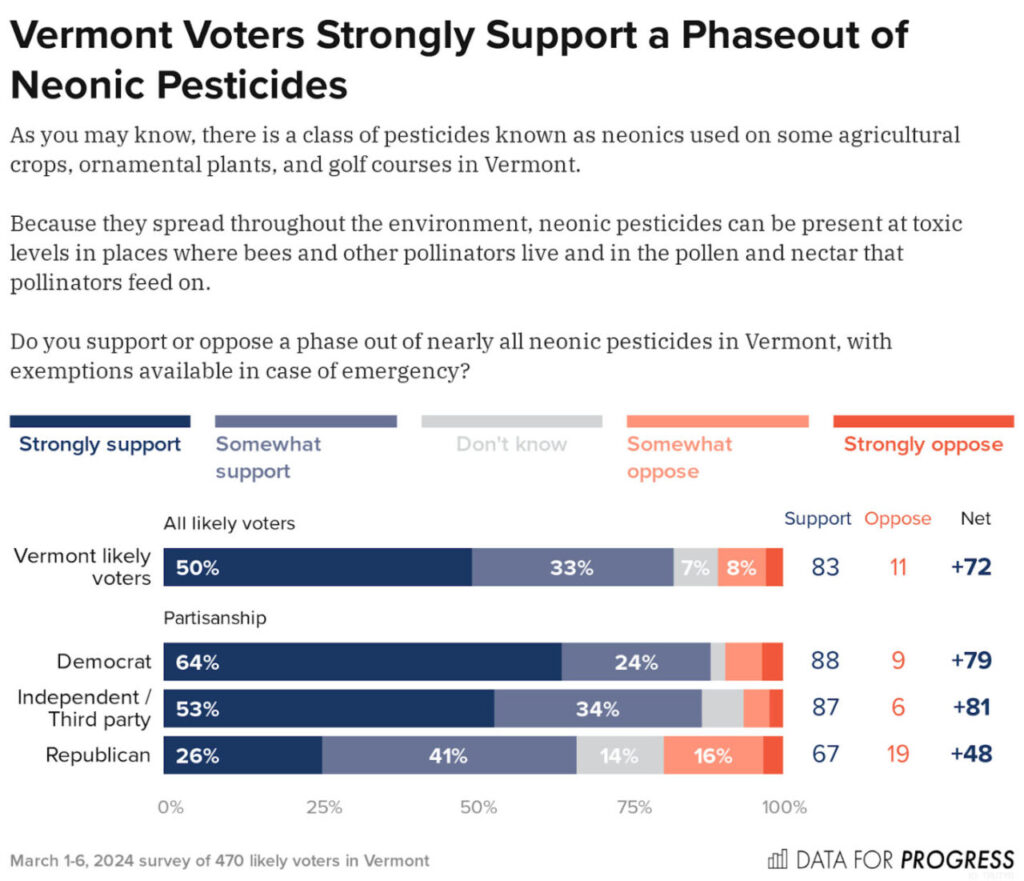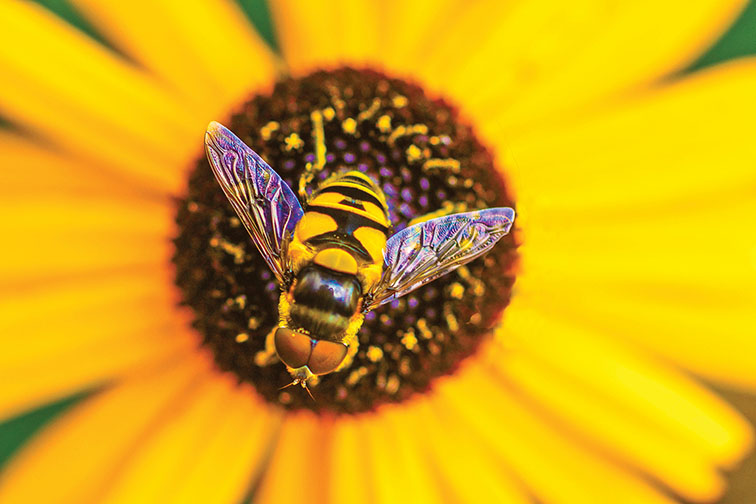The Vermont House of Representatives gave its strong endorsement March 21 to legislation designed to protect bees and other pollinators in the state from toxic neonicotinoid pesticides, known commonly as neonics. The vote in the House was 112-29.
The bill (H.706) has four main components:
- It prohibits the use of field crop seeds (corn, soy, wheat, and cereal) treated with neonicotinoids;
- It restricts outdoor uses of neonicotinoids that are harmful to pollinators;
- It requires best management practices for allowed neonicotinoid uses;
- It incorporates neonicotinoid-treated seeds into the regulatory framework that already applies to other neonicotinoids.
It also includes an emergency exemption that allows the Agency of Agriculture, Food & Markets, in consultation with the Agency of Natural Resources, to lift the prohibition if seed companies fail to provide farmers with a sufficient supply of neonicotinoid-free seed or if requiring farmers to purchase neonicotinoid-free seed would cause financial hardship.
Finally, it provides farmers, service providers, seed dealers, and seed companies with time to prepare by delaying the prohibition’s start date until Jan. 1, 2029, the same date that a similar prohibition begins in New York state.
A statewide public opinion survey released this week by the Vermont Public Interest Research Group found nearly universal agreement among Vermonters about the importance of pollinators such as bees, butterflies, and moths, and deep concern over their declining numbers.
The survey also found 83% of Vermonters in support of “a phaseout of nearly all neonic pesticides in Vermont, with exemptions available in case of emergency.” This language tracks the key elements of H.706.
“For people who eat, today’s vote to better protect bees and other pollinators in Vermont is real victory,” said Paul Burns, executive director of VPIRG. “VPIRG applauds the House for finding a way to do right by both bees and farmers in the same bill.”
“Vermonters know where their food comes from, and they value the role that bees and other pollinators play in making that food possible,” Burns continued. “With bee colonies collapsing at an alarming rate, Vermonters across the board want to see action to phaseout the unnecessary use of toxic neonicotinoid pesticides along with reasonable protections for farmers as they transition to safer alternatives.”

Courtesy Vermont Public Interest Research Group
Survey data shows Vermonters overwhelmingly support removing neonic toxins from crops.

Submitted
Bees are critical for pollinating food crops, but Vermont beekeepers loose 53% of hives each year.
Since their introduction in the mid-1990s, neonicotinoid pesticides (“neonics”) have made U.S. agriculture 48-times more harmful to insects and been linked with massive losses of bees. Over the most recent five-year period for which data are available, Vermont beekeepers lost an average 53% of their hives every year. These losses of managed bees provide insight into the losses occurring each year in Vermont’s 300+ species of wild bees, which undergird ecosystems and are also important crop pollinators.
“I want to be clear, bees and other pollinators in Vermont are in steep decline. Neonic pesticide exposure is a key reason behind this decline, and neonics actually provide no clear benefit to most farmers that use them,” said Bianca Braman, vice president of the Vermont Beekeepers Association board of directors. “Vermont’s beekeepers play a vital role in our state’s agricultural economy and food security. As farmers, we’re asking the state to phase-out the unnecessary use of a chemical that’s threatening to wipe out our small but critically important livestock.”
A 2023 assessment by the U.S. Environmental Protection Agency (EPA) found that the three most commonly-used neonics likely jeopardize the continued existence of over 200 threatened and endangered species, including pollinators such as bees and butterflies, as well as other beneficial insects like dragonflies.
Neonics are so lethal that just one corn seed coated with a neonic pesticide can contain enough toxin to kill over 100,000 bees or a small songbird. Even lower levels of exposure can weaken and impair pollinators and other forms of wildlife, making it harder for bees, birds, and other species to survive and reproduce.
The argument in favor of phasing out the use of neonics in Vermont is based not only on the toxicity of the chemicals, but also on the testimony of multiple researchers who told legislators that the use of neonic-treated corn and soybean seeds seems to provide few if any benefits to farmers.
“Neonicotinoid seed treatments offer farmers almost no benefit and poison the pollinators that make growing healthy food possible,” said Scott Sanderson, staff attorney and manager of Conservation Law Foundation’s farm and food initiative. “With today’s vote, the Vermont House took a critical step to protect the state’s agricultural economy, all while providing farmers necessary safeguards.”
“Vermont’s legislators have taken a major step forward in safeguarding the health of pollinators by passing H706. Farmers are being sold neonicotinoid seed treatments that do not benefit them, and their widespread use is causing harm to bees, aquatic insects, and the many food chains that depend on insects” said Emily May, pollinator conservation biologist, The Xerces Society for Invertebrate Conservation.
Vermonters appear ready to give bees a chance. According to the poll, 96% of those surveyed agreed that pollinator species like bees, butterflies, moths, and bats are important to Vermont’s agriculture; 85% said that the pollinators were very important.
“This is an exciting first step in ultimately reducing the use of harmful pesticides that are a threat to birds, pollinators, and people. It is clear that Vermonters care about our farms and a healthy environment” said Margaret Fowle, senior conservation biologist, Audubon Vermont.




